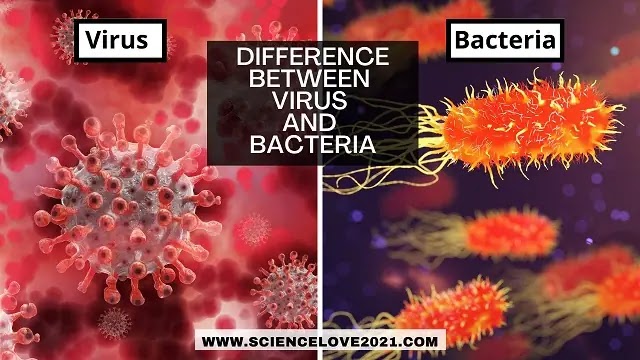Difference between Virus and Bacteria
Introduction of Virus
Antonie van Leeuwenhoek discovered micro-organisms, they are called FATHER of MICROBIOLOGY. Viruses are made up of protein molecule and are very microscopic. It is simpler and more subtle than fossils.
Introduction of Bacteria
Bacteria are prokaryotic. It is unicellular. It is the most abundant of all micro-organisms. It is the simplest of all living beings and can live almost everywhere.
There are many differences between virus and bacteria, which are described as follows -
Difference between Virus and Bacteria-
- Viruses are measured in milli microns (μm). Whereas bacteria are measured in microns (μ).
- Viruses are usually 10 to 300 µm in size. These can only be seen by electron microscope. Whereas bacteria generally range in size from 24μ to 10μ. Some bacteria can also be seen under a light microscope.
- Viruses are considered to be the link between non-living and living beings. Whereas bacteria are members of very ancient living beings.
- Viruses do not have any cellular structures in their bodies. Whereas bacteria have a cellular structure in their body.
- Viruses do not have a cell wall. Whereas bacteria have a cell wall.
- Viruses can pass through the filter paper. That is, they cannot be separated by filtering them with filter paper. Whereas bacteria can be separated by filtering them with filter paper.
- Viruses do not have protoplasm. Whereas in bacteria, protoplasm, nuclear material and ribosomes are found.
- Chemically, viruses are made up of only proteins and nucleic acids. Whereas bacteria contain various chemical substances, such as carbohydrates, fats, proteins, salts, etc.
- Only one type of nucleic acid – DNA or RNA is found in a type of virus. Whereas both the nucleic acids DNA and RNA are found in the nuclear material of bacteria.
- Viruses cause harmful diseases in other organisms. Whereas, there are both beneficial and harmful types of bacteria.
- Viruses are the obligate parasite. Whereas bacteria are autotrophs or heterotrophs (parasites, motile or symbiotic).
- Viruses cannot make enzymes or synthesize proteins in the absence of host cells. Whereas bacteria can manufacture enzyme in suitable medium and also carry out protein synthesis.
- In the virus only self-replication takes place. Whereas in bacteria asexual reproduction takes place by fission and sexual reproduction also takes place.
- Viruses reproduce only in living cells. They cannot be cultured outside the cell. Whereas bacteria reproduce outside the cell as well. These can be cultured in the laboratory in proper medium.
- Some viruses parasitize bacteria and destroy them. Whereas bacteria are never parasitic on viruses and do not cause harm.



No comments:
Post a Comment